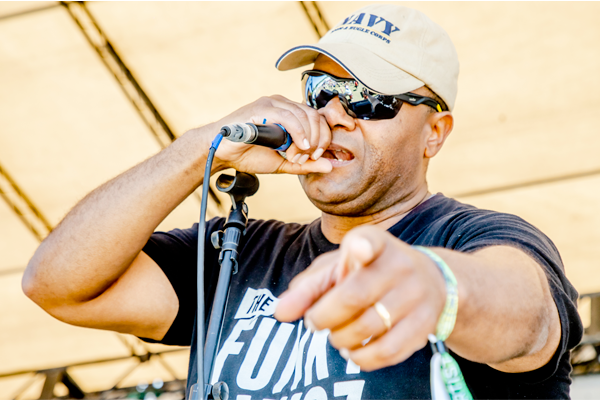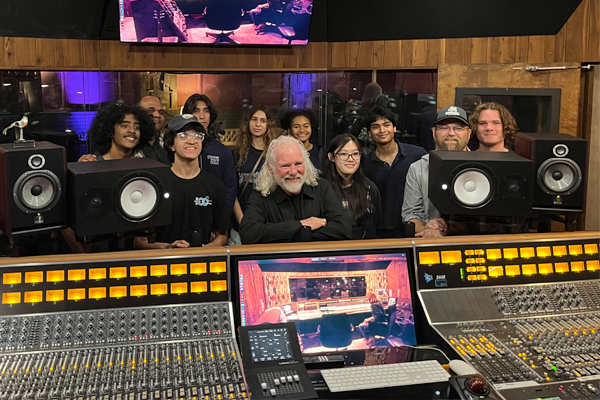Born to be a musician, Assistant Professor Marvin McNeill helps his students shine bright.

Music is in the genes for Oxford Assistant Professor Marvin McNeill. “I have always loved music, even when I was, according to my parents, still in the womb,” he shares. His father was a military musician, and family members recant “that I would crawl to my dad’s tuba and try to blow in the mouthpiece before I could walk.” Oxford News interviewed McNeill to understand how this noted musician keeps time in his busy teaching and performance schedule.
Oxford News: As the son of an Army father your childhood included life in Maryland, Japan, and Virginia. Is it true you started your first band in fourth grade as you played trombone?
Marvin McNeill: That’s right. I was lucky to be chosen for a special group of elementary school musicians who formed a New Orleans-style jazz band. We represented the program well. I remember my peers as exceptional musicians, especially for our age. We played songs like “The 12th Street Rag” and “Jazz Me Blues.” We were the Funky Dawgz of Manor View Elementary School in Fort Meade, Maryland.

“Funky Dawgz came together and assembled a repertoire of music in the New Orleans brass band style, and once we went public, our popularity took off like a rocket, locally, then nationally, and even to international venues. To give back to at-risk youth, we also started a weekly afterschool program and summer camp.”
OXF News: Joining the Americanettes must have broadened the scope of your musical prowess. Can you tell us more?
McNeill: The Americanettes were a drumline, and we performed in parades and competed with other drumlines in the area. I was the youngest member of the group and played the bass drum.
Oxford News: Your musical experience mounted, and you mastered the trombone, sousaphone, percussion, drum set, baritone, and bass guitar. You performed in orchestras, wind ensembles, jazz ensembles, and jazz combos, leading to many rich travel opportunities and experiences.
McNeill: While at Virginia Tech, I toured nationally with a Drum and Bugle Corps from Ohio. The experience was intense, and I grew as a musician and prepared for the professional world. During the last two years of my undergraduate studies, I played trombone in the New Orleans Jazz band at Paramount’s Kings Dominion in Doswell, Virginia, and believe it or not, with a German band, complete with authentic lederhosen. You haven’t truly lived until you walk around in the summer heat wearing pure leather bibbed shorts.
OXF News: You are now a performer, teacher, arranger, and ethnomusicologist with extensive expertise in the study of marching and pep bands. Were you always inspired to make music your career?
McNeill: Yes. In addition to performing, I studied music education. In my senior year, my Wind Ensemble director recommended me for a graduate assistantship with the “Pride of Connecticut,” University of Connecticut’s marching band. That position solidified my career track.
OXF News: Your career included university roles as Director of Bands and Assistant Director of Athletic Bands. Student musician participation skyrocketed, and your innovative halftime shows received high honors.
McNeill: The University of Connecticut Marching Band earned two-time finalist recognition for the Sudler Trophy, which honors the top national collegiate marching bands. I served as the primary arranger for the bands, creating nearly one hundred arrangements for the marching, pep, and brass bands.
OXF News: At a career crossroads, you opted to pursue your Master of Arts and PhD in ethnomusicology at Wesleyan University.
Ethnomusicology is the interdisciplinary study of music within its social and cultural contexts. This field utilizes music as a foundational aspect of study to comprehend its significance to practitioners and audiences alike. Ethnomusicologists view music as a social process that enhances our understanding of human life. The inspiration for my new career path came from my creation and involvement with the Funky Dawgz Brass Band I formed in 2012 from members of the UConn Marching Band.
OXF News: Hasn’t New Orleans jazz taken your recent work in new directions?
McNeill: When I first traveled with the pep band that played at the NCAA Women’s Final Four, I heard New Orleans brass bands live on the streets. I was blown away! I dug into the cultural tradition, collected recordings, and studied the music’s repertoire, style, and function that evolved, in part, into the New Orleans’ “jazz funeral” tradition.
OXF News: Music plays an important role in society, and your research looks at community and social bonding through the lens of New Orleans’ brass bands and HBCU marching bands. Can you elaborate?
McNeill: The To Be Continued Brass Band of New Orleans sparked my curiosity. Members were all Black male youths in a city with an incredibly high homicide rate for that same demographic. Why hadn’t I heard more about these bands on the street, doing something positive for their communities and providing the aesthetic that draws millions of people to the city from around the world? In my research, I found that these band members are discovering how to be part of a community through their participation in the band, both in their performance and roles within the ensemble, as well as the functions they fulfill for the community. In a nation where Black male youth are being blamed or associated with negative aspects of society, I decided to help change the narrative by learning from those who are contributing in positive ways to society. I’ve only just begun to understand music’s role in social bonding.
OXF News: How do you celebrate music at Oxford and Emory?
McNeill: We have exceptionally talented music students at Oxford and I feel fortunate to teach a variety of music and socio-cultural courses at Oxford and Emory, along with Chamber Ensemble and Oxford Soul Collective. I would like to create another group like the Funky Dawgz, as I believe the metro-Atlanta area would truly embrace such a band.

"My Discovery Course focused on the history of rock and R&B has been an incredible highlight as the class learned about the significance of this music and its impact on popular music culture today. We met Otis Redding’s daughter Karla Redding-Andrews and grandson at the Otis Redding Museum in Macon, Georgia.” Pictured is the class at Capricorn Studios with pianist Chuck Leavell from the Rolling Stones and Allman Brothers Band.
Fast Facts About University Marching Bands
Playing in a university marching band requires talent, discipline, passion, pride, and a strong work ethic.
- Band members are all full-time students who only receive one academic credit for their work per semester.
- A typical week for the marching band involves two-hour rehearsals on Tuesday and Thursday and two-and-a-half hours on Friday.
- Game days might involve ten-hour travel days for band members.
Learn more about music and music performance at Oxford and at Emory.